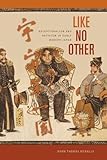Like No Other : Exceptionalism and Nativism in Early Modern Japan / Mark T. McNally.
Material type: TextPublisher: Honolulu : University of Hawaii Press, [2015]Copyright date: ©2016Description: 1 online resource (344 p.)Content type:
TextPublisher: Honolulu : University of Hawaii Press, [2015]Copyright date: ©2016Description: 1 online resource (344 p.)Content type: - 9780824852849
- 9780824852856
- 181/.12 23
- B5243.K6 M39 2015
- online - DeGruyter
- Issued also in print.
| Item type | Current library | Call number | URL | Status | Notes | Barcode | |
|---|---|---|---|---|---|---|---|
 eBook
eBook
|
Biblioteca "Angelicum" Pont. Univ. S.Tommaso d'Aquino Nuvola online | online - DeGruyter (Browse shelf(Opens below)) | Online access | Not for loan (Accesso limitato) | Accesso per gli utenti autorizzati / Access for authorized users | (dgr)9780824852856 |
Frontmatter -- Contents -- Tables -- Acknowledgments -- Prologue -- Introduction Nativism, Exceptionalism, Emics, And Etics -- Chapter One. Kokugaku, Nativism, And "Exceptional" Japan -- Chapter Two. Sonnō-Jō'I Nativism And Bakumatsu Japan -- Chapter Three. Proving Uniqueness And Asserting Superiority: The History Of Exceptionalism -- Chapter Four. Seventeenth-Century Tokugawa Exceptionalism -- Chapter Five. From Exceptionalism To Nativism: Mitogaku And Nineteenth-Century Japan -- Conclusion. Transcending Confucian Hierarchy With A Logocentric Binary -- Epilogue -- Notes -- Glossary -- References -- Index -- About The Author
restricted access online access with authorization star
http://purl.org/coar/access_right/c_16ec
Like No Other: Exceptionalism and Nativism in Early Modern Japan probes the association of the early modern Japanese intellectual institution called Kokugaku with the phenomenon of nativism. Uncovering profound differences that cast serious doubt on this association, Mark McNally argues that what Japanologists viewed as nativistic about Kokugaku were actually more typical of what Americanists call exceptionalism. By severing the link between Kokugaku and nativism, he is able to explore within early modern Japanese history instances that were more genuinely nativistic, such as the upheaval associated with the intercultural encounters with Westerners during the 1850s and 1860s that culminated in the overthrow of Japan's last shogun. He also documents, for the first time in Japanese studies, the ways in which exceptionalism applies to Japanese history; not by focusing on either Nihonjinron or on Kokugaku-the connection between the former and exceptionalism is one that Americanists have already made, and the connection between the two Japanese institutions is one that Japanologists already know well-but by highlighting the central role of Confucianism. While Americans looked to the Judeo-Christian tradition for their exceptionalist ideas, their counterparts in early modern Japan looked to Confucianism, whose foundational connections to exceptionalism were perhaps stronger than any analogous tradition in the West. Despite the fact that exceptionalism and nativism occupy distinct positions within the historiographical traditions of both the United States and Japan, they also intersect and overlap in the latter case, which strongly suggests that this situation may also be true in other places, including the United States.
Issued also in print.
Mode of access: Internet via World Wide Web.
In English.
Description based on online resource; title from PDF title page (publisher's Web site, viewed 29. Jul 2021)


